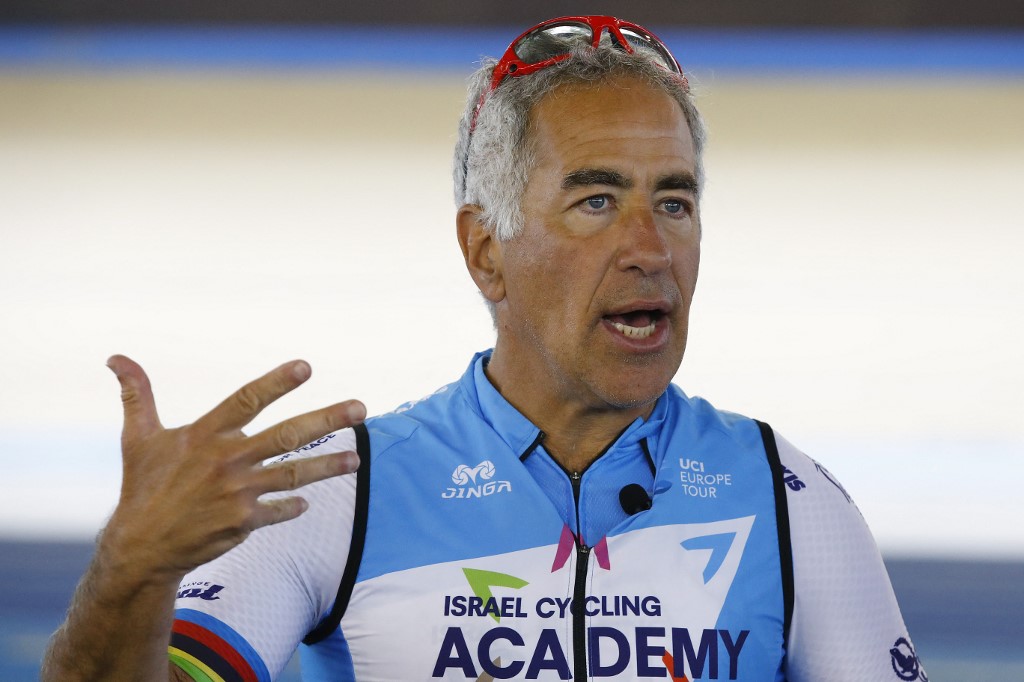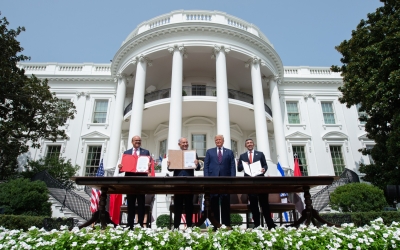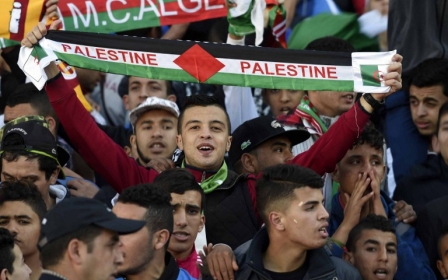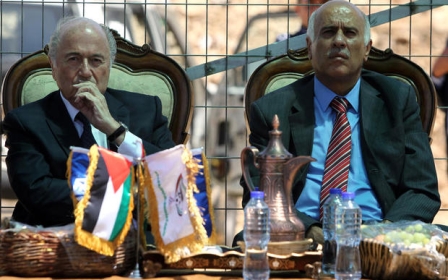Tour de France: A new arena for Israeli normalisation?
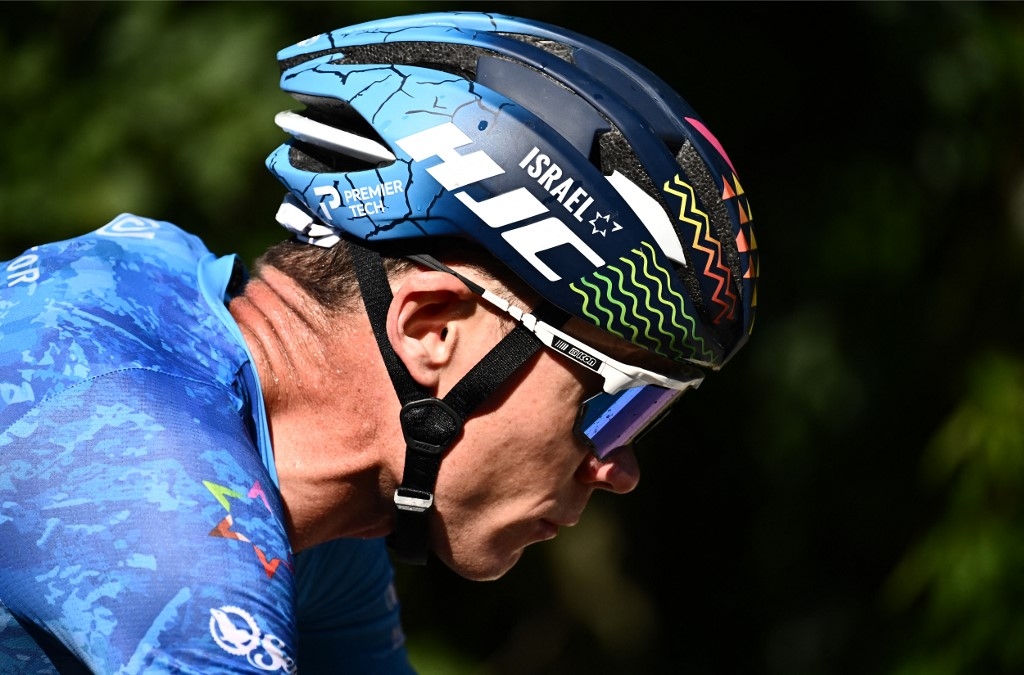
While US President Joe Biden traveled to Israel and Saudi Arabia in July to advance normalisation between the two countries, another event was simultaneously promoting the state of Israel on the global stage.
The 2022 Tour de France held last month might have been the most-watched edition of the race in more than a decade, with 41.5 million viewers on French public television alone. Throughout the race’s 21 stages, the eight-member Israel-Premier Tech team put on an unexpectedly strong performance in jerseys that proudly displayed the apartheid state’s name and national colours.
Australian rider Simon Clarke took the team’s first win on stage five, while Canadian rider Hugo Houle earned widespread adulation after winning stage 16. And four-time Tour de France champion Chris Froome, who joined Israel-Premier Tech in 2021, recovered from a years-long injury to take third place on the Alpe d’Huez climb.
The riders understand that they are 'ambassadors for the team's home country'
The Israel-Premier Tech team was formed in 2014, when Israeli businessman Ron Baron and former professional cyclist Ran Margaliot launched Israel Cycling Academy. Sylvan Adams, a Canadian-born billionaire and amateur cyclist, soon became co-owner of the team, and the Canadian industrial manufacturing firm Premier Tech joined as a title sponsor at the start of this year.
The team’s leadership has sought to recruit well-known riders and gain entry to the most prestigious cycling events. Israel-Premier Tech’s results in this year’s Tour de France show that these efforts have started to pay off, and the team will likely remain visible at the highest levels of professional cycling in the coming years.
But what does this mean for Palestinian advocacy in an age of expanding normalisation with Israel?
'Soft diplomacy'
Despite its name, Israel-Premier Tech does not represent the Israeli state in any official capacity. Adams has maintained that the team is “not a state project”, noting that sports and politics “should never mix”. But Adams also styles himself as the “self-appointed ambassador for the state of Israel”, and has taken an aggressive approach to combat the boycott, divestment and sanctions (BDS) movement through “soft diplomacy”.
In addition to Israel-Premier Tech, Adams was the main force behind the Giro d’Italia’s arrival in Israel in 2018, an event he described as the “antidote to BDS”. And his work to normalise Israel through sports extends beyond the world of cycling: He helped bring Lionel Messi and the Argentinian football team to Israel in 2019 for a match against Uruguay, and he is supporting the upcoming Middle Eastern regional Ironman championship in Tiberias.
Members of Israel-Premier Tech have tried to distance themselves from the actions of the Israeli government, saying they just want to “race bikes”. The fact that most of the team’s riders are not Israeli nationals helps in this regard. Out of the 31 riders who race at the World Tour level, only four are Israeli, and only one of those competed on the team’s eight-person roster in this year’s Tour de France.
Fundamentally, though, the team’s broader modus operandi appears to involve advancing Israeli soft-power objectives - even if inadvertently. According to Adams, the riders understand that they are “ambassadors for the team’s home country”. Some of the riders have travelled to Israel, taking part in photo-ops to reach millions of followers, and have even ridden in the occupied West Bank and Golan Heights.
And contrary to its own projected image, Israel-Premier Tech often appears to be treated as an official Israeli body. At the beginning of this year’s Tour de France, the team received the security detail provided for Israeli delegations, and Israeli media outlets claimed team victories as a “first for the Jewish state”, with additional congratulations from the Israeli tourism minister.
In this way, Israel-Premier Tech becomes part of the normalisation bandwagon as an unofficial ambassador for the Israeli regime. While BDS makes provisions for countering this kind of cultural normalisation, it is important to highlight that unofficial ambassadorship for Israel in the world of professional sports is a new and worrying phenomenon.
Exposing double standards
When we think of “sportswashing”, what often comes to mind are high-profile sporting events held in Israel - the opening days of the 2018 Giro d’Italia, for example - or official Israeli teams participating in international competitions. Israel-Premier Tech falls into neither of these categories.
Instead, the team builds on the existing name recognition and cultural capital of its roster to reach the millions of cycling fans Adams calls the “silent majority”: those who lack strong political opinions about Israel, and for whom Israel-Premier Tech offers a new and exciting image of the apartheid state.
This is unsurprising, given that many cycling fans are either unaware or simply see no need to protest other cycling teams who are sponsored by authoritarian regimes or petrochemical corporations. As football stars, basketball players and other athletes speak up for Palestinians, professional cycling presents a more promising avenue for Israeli sportswashing.
This does not mean that advocates of Palestinian rights should give up on the cycling world. They should push back against Israel-Premier Tech’s attempts to distance itself from the Israeli government, and refuse the distinction between sports and politics. As Palestinian and allied organisations have argued, Israel-Premier Tech is Israel in professional cycling and should be treated as such.
Following the example of French BDS chapters, Palestine advocates should protest the team’s presence at all public events, and expose the double standards that prevent certain authoritarian governments from sponsoring teams but not others.
The BDS movement should likewise push the team’s most famous athletes, particularly Froome - whom Adams explicitly hired to help transform Israel’s international image - to account for their ambassadorship on behalf of Israel, and protest Premier Tech’s involvement in the project as a primary funder.
As Saudi Arabian, Qatari and other Arab sportswashing ventures continue to grab headlines, BDS advocates should highlight Israel-Premier Tech as part of this troubling trend - one that aligns with the broader goals of normalisation between Israel and the Arab world.
Finally, Palestinians and their allies should not lose sight of the man behind the team. Adams is currently coordinating with the Saudi Arabian sport minister to place a bid for Israel to co-host the 2030 World Cup with Saudi Arabia, Egypt and the UAE.
Despite his already-large influence in Israeli diplomacy, Adams maintains that he is “just getting started” - a clear wakeup call for supporters of Palestinian rights and sports fans worldwide to demand an end to the complicity of sports institutions in the ongoing dispossession of the Palestinian people.
The views expressed in this article belong to the author and do not necessarily reflect the editorial policy of Middle East Eye.
This article is available in French on Middle East Eye French edition.
Middle East Eye propose une couverture et une analyse indépendantes et incomparables du Moyen-Orient, de l’Afrique du Nord et d’autres régions du monde. Pour en savoir plus sur la reprise de ce contenu et les frais qui s’appliquent, veuillez remplir ce formulaire [en anglais]. Pour en savoir plus sur MEE, cliquez ici [en anglais].



